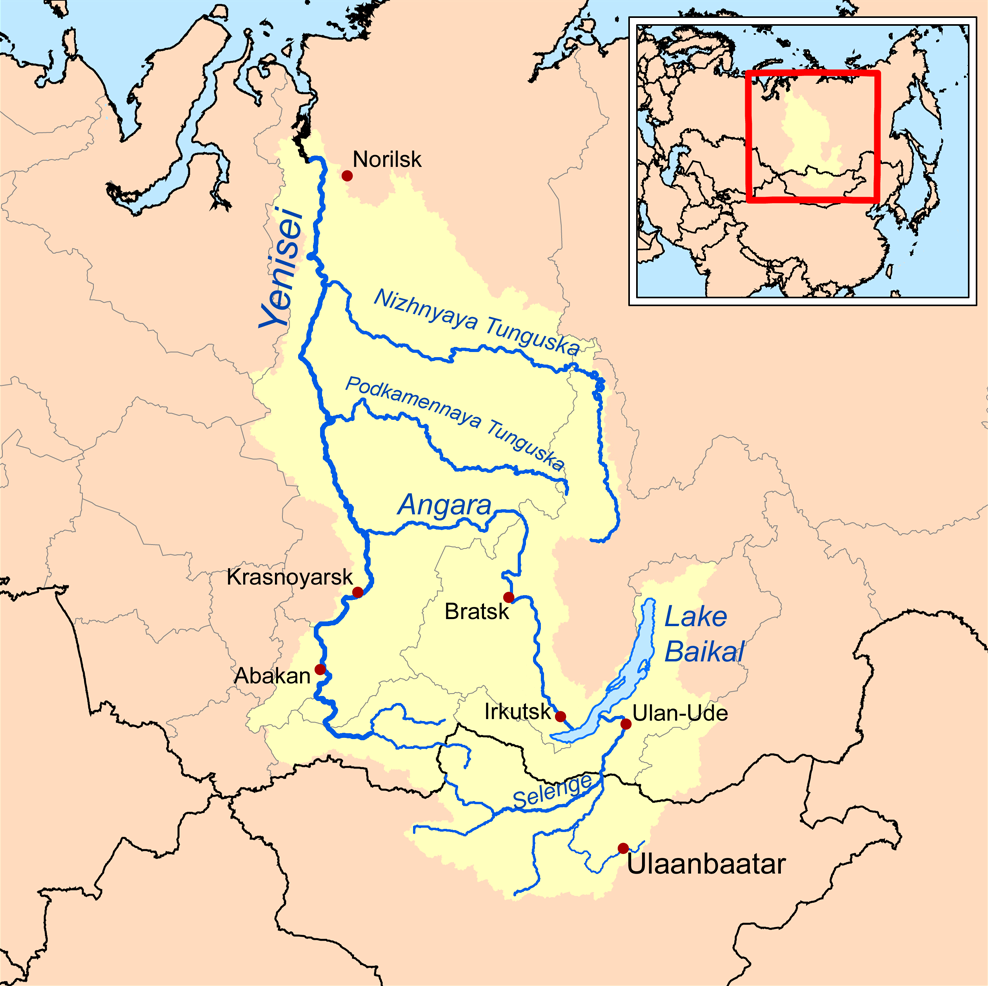
Map of the Yenisei River showing national borders
“The 5.8 km long pipeline is a key component of Vostok Oil, the biggest industrial project currently unfolding in the Russian Arctic. According to Russian state oil company Rosneft and its subsidiary RN-Vankor, as many as 25 ships have taken part in dredging operations in the Yenisei during summer 2023. As winter approached, the company started laying the pipeline on the riverbed. The new pipeline will cross the Yenisei River near Tochina.”
Amid sanctions, Russia continues to develop the infrastructure necessary to exploit and export its vast natural resources, especially in the Arctic. The Yenisei River is a major river flowing northward that originates in Mongolia and bisects Russia. It is a key economic transport route of vital energy and metals from the industrial city and extraction centers of Norilsk. According to the excerpted article from Norway-based The Barents Observer, products move by rail from Norilsk to the river port of Dudinka, where they are shipped to the Arctic Ocean and then to ports east and west on the Northern Sea Route. Russia is investing heavily in increasing the carrying capacity of the Northern Sea route,[i] already moving energy to its Pacific customers on ice-class LNG carriers and oil tankers. The Dudinka port is at capacity and the riverside village of Tochina is being rapidly expanded. Reportedly, 21 riverside terminals are under construction to handle petroleum exports. Russia’s focus on new routes to its Asian markets, China and North Korea, will help it circumvent the sanctions and survive a protracted war in Ukraine.
Sources:
Atle Staalesen, “Oilmen start building of underwater pipeline across the Yenisei,” The Barents Observer (independent Norwegian news site in Russian and English currently blocked in Russia), 19 December 2023. https://thebarentsobserver.com/en/industry-and-energy/2023/12/oilmen-start-building-underwater-pipeline-across-yenisey
The 5.8 km long pipeline is a key component of Vostok Oil, the biggest industrial project currently unfolding in the Russian Arctic. According to Russian state oil company Rosneft and its subsidiary RN-Vankor, as many as 25 ships have in taken part in dredging operations in the Yenisei during summer 2023. As winter approached, the company started laying the pipeline on the riverbed. The new pipeline will cross the Yenisey River near Tochina.
The pipes have a 820 mm diameter and wall thickness of 22 mm. The 5,8 km long installation will connect the eastern and western shores of the major Arctic river. Its starting point is in the village of Tochina, about 60 km north of Dudinka.
Rosneft is under great time pressure to build this part of the Vostok Oil project. On a number of occasions, company CEO Igor Sechin has reiterated that the project will produce more than 30 million tons already in 2024. By 2030, the Vostok Oil will produce more than 100 million tons per year, most of it to be exported through the Northern Sea Route to Asian buyers.
A significant number of wells are drilled in the Taymyr Peninsula and several hundred km of pipeline are under construction. The oil will be exported from the Sever Terminal on the coast of the Yenisei Bay.
In the course of summer 2023, more than one million tons of goods have reportedly been shipped to the construction sites along the Yenisei, including 120,000 tons of oil pipes.
Rosneft have developed 21 mooring point for ship deliveries in the area and as many as 402 ships have reportedly been involved in project shipments this year.
Notes:
[i] For additional reporting on Russian activity in the Arctic see: Les Grau, “Russian Arctic Seaports Expand Activity Despite War In Ukraine,” OE Watch, 03-2023. https://fmso.tradoc.army.mil/2023/russian-arctic-seaports-expand-activity-despite-war-in-ukraine/
Image Information:
Image: Map of the Yenisei River showing national borders
Source: Kmusser, https://commons.wikimedia.org/wiki/File:Yeniseirivermap.png
Attribution: CCA-Share Alike 3.0 Unported
